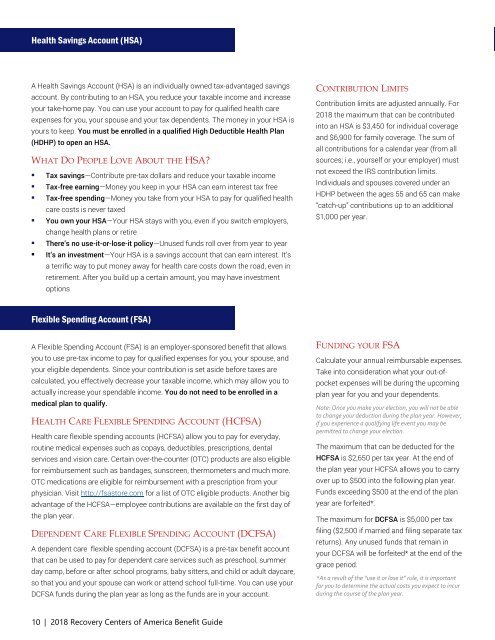RCA Benefit Guide
Create successful ePaper yourself
Turn your PDF publications into a flip-book with our unique Google optimized e-Paper software.
Health Savings Account (HSA)<br />
A Health Savings Account (HSA) is an individually owned tax-advantaged savings<br />
account. By contributing to an HSA, you reduce your taxable income and increase<br />
your take-home pay. You can use your account to pay for qualified health care<br />
expenses for you, your spouse and your tax dependents. The money in your HSA is<br />
yours to keep. You must be enrolled in a qualified High Deductible Health Plan<br />
(HDHP) to open an HSA.<br />
WHAT DO PEOPLE LOVE ABOUT THE HSA?<br />
• Tax savings—Contribute pre-tax dollars and reduce your taxable income<br />
• Tax-free earning—Money you keep in your HSA can earn interest tax free<br />
• Tax-free spending—Money you take from your HSA to pay for qualified health<br />
care costs is never taxed<br />
• You own your HSA—Your HSA stays with you, even if you switch employers,<br />
change health plans or retire<br />
• There’s no use-it-or-lose-it policy—Unused funds roll over from year to year<br />
• It’s an investment—Your HSA is a savings account that can earn interest. It’s<br />
a terrific way to put money away for health care costs down the road, even in<br />
retirement. After you build up a certain amount, you may have investment<br />
options<br />
CONTRIBUTION LIMITS<br />
Contribution limits are adjusted annually. For<br />
2018 the maximum that can be contributed<br />
into an HSA is $3,450 for individual coverage<br />
and $6,900 for family coverage. The sum of<br />
all contributions for a calendar year (from all<br />
sources; i.e., yourself or your employer) must<br />
not exceed the IRS contribution limits.<br />
Individuals and spouses covered under an<br />
HDHP between the ages 55 and 65 can make<br />
“catch-up” contributions up to an additional<br />
$1,000 per year.<br />
Flexible Spending Account (FSA)<br />
A Flexible Spending Account (FSA) is an employer-sponsored benefit that allows<br />
you to use pre-tax income to pay for qualified expenses for you, your spouse, and<br />
your eligible dependents. Since your contribution is set aside before taxes are<br />
calculated, you effectively decrease your taxable income, which may allow you to<br />
actually increase your spendable income. You do not need to be enrolled in a<br />
medical plan to qualify.<br />
HEALTH CARE FLEXIBLE SPENDING ACCOUNT (HCFSA)<br />
Health care flexible spending accounts (HCFSA) allow you to pay for everyday,<br />
routine medical expenses such as copays, deductibles, prescriptions, dental<br />
services and vision care. Certain over-the-counter (OTC) products are also eligible<br />
for reimbursement such as bandages, sunscreen, thermometers and much more.<br />
OTC medications are eligible for reimbursement with a prescription from your<br />
physician. Visit http://fsastore.com for a list of OTC eligible products. Another big<br />
advantage of the HCFSA—employee contributions are available on the first day of<br />
the plan year.<br />
DEPENDENT CARE FLEXIBLE SPENDING ACCOUNT (DCFSA)<br />
A dependent care flexible spending account (DCFSA) is a pre-tax benefit account<br />
that can be used to pay for dependent care services such as preschool, summer<br />
day camp, before or after school programs, baby sitters, and child or adult daycare,<br />
so that you and your spouse can work or attend school full-time. You can use your<br />
DCFSA funds during the plan year as long as the funds are in your account.<br />
FUNDING YOUR FSA<br />
Calculate your annual reimbursable expenses.<br />
Take into consideration what your out-ofpocket<br />
expenses will be during the upcoming<br />
plan year for you and your dependents.<br />
Note: Once you make your election, you will not be able<br />
to change your deduction during the plan year. However,<br />
if you experience a qualifying life event you may be<br />
permitted to change your election.<br />
The maximum that can be deducted for the<br />
HCFSA is $2,650 per tax year. At the end of<br />
the plan year your HCFSA allows you to carry<br />
over up to $500 into the following plan year.<br />
Funds exceeding $500 at the end of the plan<br />
year are forfeited*.<br />
The maximum for DCFSA is $5,000 per tax<br />
filing ($2,500 if married and filing separate tax<br />
returns). Any unused funds that remain in<br />
your DCFSA will be forfeited* at the end of the<br />
grace period.<br />
*As a result of the “use it or lose it” rule, it is important<br />
for you to determine the actual costs you expect to incur<br />
during the course of the plan year.<br />
10 | 2018 Recovery Centers of America <strong>Benefit</strong> <strong>Guide</strong>


